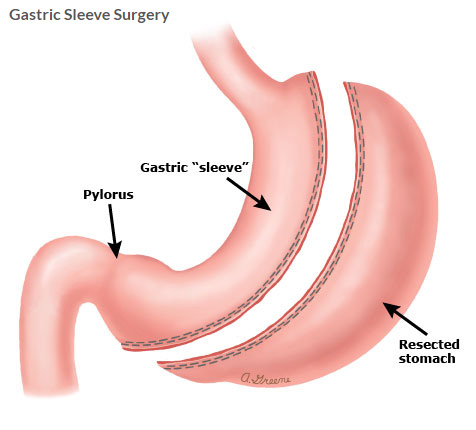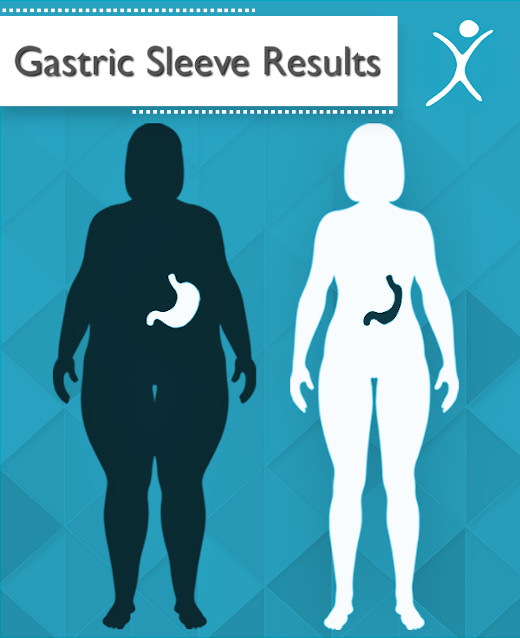Gastric Sleeve Surgery
Gastric sleeve surgery, also known as sleeve gastrectomy, is a surgical procedure that aims to aid weight loss in individuals with obesity. It involves the removal of a large portion of the stomach to create a smaller, sleeve-shaped stomach. This reduction in stomach size helps limit food intake and promotes a feeling of fullness, leading to weight loss. In addition to reducing the size of the stomach, this procedure is also include removing the hunger hormone (Ghrelin) located just above the stomach valve. Thus, a high level of weight loss is experienced in a short time, along with the reduced stomach and the decrease in the feeling of hunger.

- How Gastric Sleeve Surgery is preformed in Turkey?
- Who are Suitable for Gastric Sleeve Surgery?
- Body Mass Index Calculator
- What are the risks or side effects of Gastric Sleeve Surgery in Turkey?
- What are the benefits of Gastric Sleeve in Turkey?
- What are the disadvantages of Gastric Sleeve in Turkey?
- What to expect after Gastric Sleeve in Turkey?
- How much weight can be lost with Gastric Sleeve in Turkey?
- How much does Gastric Sleeve cost in Turkey?
- Why choose Elan to have Gastric Sleeve in Turkey?
- Quick facts of Gastric Sleeve in Turkey
How Gastric Sleeve Surgery is performed in Turkey?
Gastric sleeve surgery is conducted while the patient is under general anesthesia. Typically, this procedure is carried out using minimally invasive keyhole (laparoscopic) techniques and lasts between 60 and 90 minutes.
During the operation, the surgeon employs a stapling device to form a narrow tube or 'sleeve' within the stomach, subsequently removing the remaining portion (%70-80) of the stomach.
By removing majority of the stomach, the body’s production of ghrelin, known as the “hunger hormone,” is significantly reduced. Consequently, many individuals experience a notable decrease in appetite following sleeve gastrectomy. Additionally, ghrelin influences blood sugar metabolism, leading to an immediate reduction in the need for diabetes medications (particularly oral ones) in people with type II diabetes after undergoing the procedure.

Who are suitable for Gastric Sleeve Surgery?
Gastric sleeve surgery is typically recommended for individuals who meet certain criteria and have been unable to achieve sustainable weight loss through non-surgical methods such as diet and exercise. While each case is unique and should be evaluated by a healthcare professional, here are general guidelines for individuals who may be considered suitable candidates for gastric sleeve surgery
It's important to note that these criteria serve as general guidelines, and the final decision regarding candidacy for gastric sleeve surgery should be made after a comprehensive evaluation by a qualified healthcare professional. They will assess your individual health status, weight history, lifestyle factors, and specific goals to determine the most appropriate treatment options for your unique situation.
What are the risks or side effects of Gastric Sleeve Surgery in Turkey?
Gastric sleeve surgery, like any surgical procedure, carries risks and potential complications. It's essential to be aware of these risks and take necessary precautions to minimize them. Here are some possible complications associated with gastric sleeve surgery
It's important to note that complications are relatively rare, and the majority of gastric sleeve surgeries are successful with favorable outcomes. However, it is crucial to choose an experienced surgeon and follow all pre-operative and post-operative instructions carefully to reduce the risks associated with the procedure. Regular follow-up appointments and open communication with your healthcare team are vital for monitoring your progress, addressing any concerns promptly, and ensuring a successful recovery.
What are the benefits of Gastric Sleeve in Turkey?
Gastric sleeve surgery, like any surgical procedure, carries risks and potential complications. It's essential to be aware of these risks and take necessary precautions to minimize them. Here are some possible complications associated with gastric sleeve surgery
What are the disadvantages of Gastric Sleeve in Turkey?
- Its an irreversible procedure.
- Can cause acid reflux or heart burn.
- Indigestion, nausea, diarrhea and stomach obstruction can be seen due to change on the size of the stomach after the procedure.
- Possibility of stomach expansion over time.
- Nutritient and vitamin defficiency due to eating less than usual.
What to expect after Gastric Sleeve in Turkey?
You'll probably be discharged from the hospital 3 to 4 days after surgery. Initially, you'll be on a liquid diet for the first week or two. Your surgical team will provide a meal plan for the following weeks, transitioning from liquids to pureed foods, then soft foods, and eventually to regular food. Each meal should be very small. Eat slowly and chew thoroughly. Avoid moving too quickly to regular food to prevent pain and vomiting. Collaborate with your healthcare team to determine the best foods for you. Once your stomach heals, you'll need to adopt new eating habits, consuming small meals to suit your smaller stomach.
After weight-loss surgery, you might struggle to get enough vitamins and minerals due to reduced food intake and nutrient absorption. You may need a daily multivitamin and a calcium-vitamin D supplement. Additional nutrients, such as vitamin B-12 or iron, might also be necessary. Your healthcare team will provide specific instructions.
You'll need regular blood tests every few months during the first year after surgery to ensure you don't have low blood iron (anemia), high blood glucose, or low calcium or vitamin D levels. If you experience heartburn, you might need medication to reduce stomach acid.
Although you'll lose weight after surgery, there's a chance of regaining some of it. To avoid this, maintain a healthy diet and exercise regularly. The sleeve may expand over time, allowing you to eat more. Remember, eating excessively can lead to weight regain. Consider joining a weight-loss surgery support group to help maintain your new eating habits. Ask your healthcare provider for a list of trustworthy resources.
How much weight can be lost & when can the target weight be reached with Gastric Sleeve in Turkey?
Your weight loss progression after gastric sleeve surgery will vary based on factors such as your initial weight, dietary habits post-surgery, age, lifestyle, and pre-existing health conditions. On average, patients can anticipate losing between 4 to 8 kg (8 to 16 pounds) per month. Here is a typical weight loss timeline for patients following gastric sleeve surgery:
How much does Gastric Sleeve cost in Turkey?
| Country | Average Cost |
|---|---|
| 🇹🇷 Turkey | £2,500 - £4,500 |
| 🇬🇧 United Kingdom | £8,000 - £12,000 |
| 🇺🇸 United States | $15,000 - $20,000 |
| 🇩🇪 Germany | €7,000 - €10,000 |
Gastric Sleeve Surgery Prices in Turkey
The cost of gastric sleeve surgery in Turkey typically ranges between £2,500 and £4,500. Prices vary depending on the hospital, the surgeon's expertise, the equipment used, and the services included. Many clinics in Turkey offer all-inclusive packages that cover:
-
Pre-operative tests and consultations
- Surgery costs
- Hospital stay (usually 2-3 days)
- Post-operative care and follow-up consultations
- Accommodation and airport transfers
Why choose Elan to have Gastric Sleeve in Turkey?
At Elan, we understand the importance of providing exceptional care and support to our clients throughout their medical travel journey. When you choose Elan for Gastric Sleeve surgery, you can expect,
- Access to renowned and experienced surge ons who specialize in Bariatric Procedures.
- State-of-the-art medical facilities equipped with advanced technology.
- Personalized assistance with travel arrangements, accommodation, and post-operative care.
- Affordable and transparent pricing options.
- A dedicated team committed to ensuring your comfort, safety, and satisfaction.
Quick facts of Gastric Sleeve in Turkey
- Procedure: It is performed by laparoscopic method by cutting most of the stomach with a stapler tool without any deep incision.
- Duration: 1 to 2 Hours
- Stay: 4 Nights Hospital Accomodation
- Anesthesia: General Anesthesia
- Recovery: 3-4 days to discharge, 1-2 weeks to back to work (depending on each patient’s medical condition)
- Clothes to Wear: Comfortable clothes (sweatshirts, button-down or zipped shirt etc.)
- Side Effects: (Possible) Diarrhea, Gas, Bloating, Vomiting, Nausea, Dehydration,Constipation, Fatigue, Hair loss, Ulcer, Malnutrition
- Exercise: After 6-8 weeks
- Scars: Small incisions
- Pain: Depending on the patient, mild.
- Results: On average 70-80 % of excess weight loss in one year
- Combined Procedures: Fixation of hietal hernia
